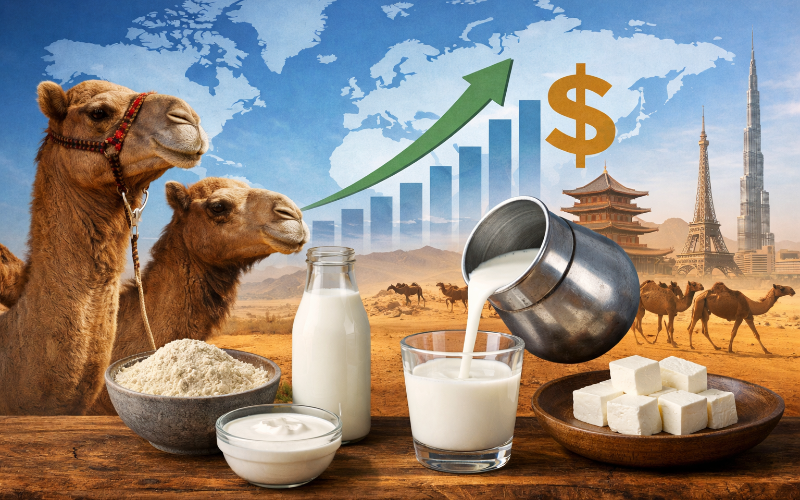New Zealand Pushes for Legal Action Against Canada Over Dairy Trade Disputes
Source: DairyNews.today
Tensions between New Zealand and Canada over dairy trade are escalating, with New Zealand's dairy industry urging the government to take decisive legal action to protect its high-value milk protein exports.

The Dairy Companies Association of New Zealand (DCANZ) has called on Trade Minister Todd McClay to urgently bring a case to the World Trade Organization (WTO) to address what they see as unfair competition from subsidized Canadian dairy exports.
DCANZ has long raised concerns about Canada’s Milk Class 4(a) system, which subsidizes milk production and, according to New Zealand producers, distorts international markets for skimmed milk powder (SMP). However, the problem has intensified as the surpluses of subsidized milk protein, traditionally converted into SMP by Canadian processors, have begun to overflow into markets for higher-value milk protein concentrates and isolates.
This development poses a significant threat to New Zealand’s dairy industry, particularly given that the Canadian government has committed $400 million to expand the country’s dairy production capacity over the next decade. DCANZ fears that increased Canadian exports could undercut New Zealand producers in key markets, including the United States.
In a letter to Minister McClay, DCANZ highlighted the potential economic impact, noting that up to $500 million in sales of milk protein concentrates and isolates to the US could be at immediate risk. Additionally, $400 million in casein sales could be threatened if Canada’s policies remain unchecked. This could significantly harm New Zealand’s dairy export revenues, which totaled $1 billion to the US in the year leading up to May 2024.
The Call for Urgent Action:
DCANZ argues that the issue is pressing and could derail the New Zealand government's economic goals, particularly its ambition to double the value of total exports. The association’s letter emphasized that export subsidies erode market opportunities and returns, especially in a context of rising volumes.
Minister McClay has acknowledged the industry’s concerns, stating that he raised the issue with his Canadian counterpart at the WTO trade ministers meeting in Abu Dhabi in March. However, before committing to a WTO lawsuit, McClay plans to meet with industry representatives to better understand the impact on New Zealand producers.
McClay noted the need for a solid legal case, emphasizing the importance of quantifying and demonstrating the harm caused by Canada’s policies. While sympathetic to the industry’s concerns, he stressed the need for careful consideration before moving forward with legal action.
Ongoing Disputes Over CPTPP Compliance:
This latest dispute comes amid ongoing tensions between New Zealand and Canada over the latter's refusal to fully open its domestic dairy markets to New Zealand exporters, as required under the Comprehensive and Progressive Agreement for Trans-Pacific Partnership (CPTPP). A panel of judges ruled against Canada last September, finding that it had failed to meet its obligations by allocating the bulk of import quotas to local processors instead of New Zealand exporters.
Although Canada introduced a new allocation method in response to the ruling, which took effect on May 1, New Zealand remains dissatisfied, arguing that Canada has still not complied with CPTPP rules. Minister McClay has indicated that New Zealand is exploring further actions, including formal consultations under CPTPP provisions, which could eventually lead to retaliatory tariffs if no resolution is reached.
While the amount of trade lost due to Canada’s actions may seem modest in the broader context, McClay emphasized that it is a matter of principle. Both countries entered the CPTPP with a mutual understanding of their obligations, and New Zealand expects Canada to fulfill its commitments just as it does.
The ongoing disputes between New Zealand and Canada underscore the complexities of international trade agreements and the challenges that arise when countries perceive that these agreements are not being honored. As the situation unfolds, New Zealand's dairy industry will be closely watching the government's next steps in defending its interests on the global stage.
DCANZ has long raised concerns about Canada’s Milk Class 4(a) system, which subsidizes milk production and, according to New Zealand producers, distorts international markets for skimmed milk powder (SMP). However, the problem has intensified as the surpluses of subsidized milk protein, traditionally converted into SMP by Canadian processors, have begun to overflow into markets for higher-value milk protein concentrates and isolates.
This development poses a significant threat to New Zealand’s dairy industry, particularly given that the Canadian government has committed $400 million to expand the country’s dairy production capacity over the next decade. DCANZ fears that increased Canadian exports could undercut New Zealand producers in key markets, including the United States.
In a letter to Minister McClay, DCANZ highlighted the potential economic impact, noting that up to $500 million in sales of milk protein concentrates and isolates to the US could be at immediate risk. Additionally, $400 million in casein sales could be threatened if Canada’s policies remain unchecked. This could significantly harm New Zealand’s dairy export revenues, which totaled $1 billion to the US in the year leading up to May 2024.
The Call for Urgent Action:
DCANZ argues that the issue is pressing and could derail the New Zealand government's economic goals, particularly its ambition to double the value of total exports. The association’s letter emphasized that export subsidies erode market opportunities and returns, especially in a context of rising volumes.
Minister McClay has acknowledged the industry’s concerns, stating that he raised the issue with his Canadian counterpart at the WTO trade ministers meeting in Abu Dhabi in March. However, before committing to a WTO lawsuit, McClay plans to meet with industry representatives to better understand the impact on New Zealand producers.
McClay noted the need for a solid legal case, emphasizing the importance of quantifying and demonstrating the harm caused by Canada’s policies. While sympathetic to the industry’s concerns, he stressed the need for careful consideration before moving forward with legal action.
Ongoing Disputes Over CPTPP Compliance:
This latest dispute comes amid ongoing tensions between New Zealand and Canada over the latter's refusal to fully open its domestic dairy markets to New Zealand exporters, as required under the Comprehensive and Progressive Agreement for Trans-Pacific Partnership (CPTPP). A panel of judges ruled against Canada last September, finding that it had failed to meet its obligations by allocating the bulk of import quotas to local processors instead of New Zealand exporters.
Although Canada introduced a new allocation method in response to the ruling, which took effect on May 1, New Zealand remains dissatisfied, arguing that Canada has still not complied with CPTPP rules. Minister McClay has indicated that New Zealand is exploring further actions, including formal consultations under CPTPP provisions, which could eventually lead to retaliatory tariffs if no resolution is reached.
While the amount of trade lost due to Canada’s actions may seem modest in the broader context, McClay emphasized that it is a matter of principle. Both countries entered the CPTPP with a mutual understanding of their obligations, and New Zealand expects Canada to fulfill its commitments just as it does.
The ongoing disputes between New Zealand and Canada underscore the complexities of international trade agreements and the challenges that arise when countries perceive that these agreements are not being honored. As the situation unfolds, New Zealand's dairy industry will be closely watching the government's next steps in defending its interests on the global stage.
Key News of the Week










